Why Abortion Care Is Important For Mental Health?
Terminating a pregnancy can be a stressful life event for some women. More than a personal loss, abortion is a social stigma. While some women may feel relieved that they made the right decision and took action to resolve a tough circumstance, others might feel a range of negative emotions. Hence, abortion is typically a stressful life event that can also affect women's mental health. While some women manage this illness well, others experience various negative health issues.
There is an association between abortion and a higher risk of mental health problems, including increased risk of depression, anxiety, and suicidal ideation. Research suggests that abortion itself does not cause mental health problems, but is linked to factors like prior mental health issues, or those who have had multiple abortions, lack of support, and the distress of being denied an abortion can contribute to negative outcomes. In this blog, we will understand why abortion care is important for mental health.
What are the Emotional Effects of Abortion?
Sadness and grief resembling those of depression might result from the loss of a loved one. Some women may experience feelings of loss, regret, despair, and suffering following a pregnancy loss or abortion.
A person is unlikely to develop depression if their symptoms progressively get better over time. But persistent or worsening symptoms may be signs of depression, and it's critical to get medical attention.
Common unpleasant emotions include:
- Shame
- Anger
- Remorse or regret
- Relationship issues
- Loss of self-esteem or self-confidence
- Feeling loneliness and isolation
- Depression: If negative feelings are intense and persistent, this could be a sign of depression
- Suicidal thoughts
Contributing Factors to the Effects on Mental Health after Abortion
Let’s discuss the factors that are linked with mental health risks after abortion:
- Stigma and discrimination: Women may experience heightened anxiety, fear, and psychological stress due to the associated stigma linked with abortion, causing detrimental psychological effects.
- Repeated abortions: A history of multiple abortions is associated with a higher risk of mental health problems.
- Lack of support: Low social support can stem anxiety, sadness, and low self-esteem in women. These psychological experiences are all associated with a lack of psychological support from family, the community, or medical professionals.
- Unintended pregnancy: Unwanted pregnancies are closely linked to negative mental health outcomes, especially depression, in later life.
- Low resilience and limited ability to adapt: An essential component of handling challenging occurrences like abortion is the capacity to adjust constructively to stressful circumstances. People with low resilience may find it more difficult to handle the psychological strain of an abortion, which raises the risk of unpleasant feelings and mental health problems.
- Pre-existing mental health conditions: People who have previously had mental health issues may be more susceptible to adverse health consequences following both pregnancy and abortion.
Common Mental Health Outcomes Post Abortion

Abortion can affect a mother’s mental health in the following ways:
- Mood problems: Following an abortion, women are more likely to experience mood disorders like sadness, depression, anxiety, and post-traumatic stress.
- Psychiatric hospitalization: Research indicates that, in comparison to women who carry a pregnancy to term, in women who have undergone abortion, there is a higher rate of psychiatric hospitalization for mental illnesses, drug use problems, and suicide attempts.
- Substance abuse and anxiety disorders: Having an abortion is also linked to an increased risk of substance abuse and anxiety problems.
- Suicidal behavior: Compared to normal pregnancies, women who have undergone abortions are more likely to experience suicidal thoughts and attempts.
Prevention and Treatment of Mental Health
If depression occurs after abortion, it is a treatable condition. The course of treatment includes:
- Assistance or support from a community group or health professional
- Counselling, which may involve cognitive behavioral therapy
- Antidepressants prescribed by your healthcare provider
- Lifestyle changes could also be beneficial, including consuming a balanced diet, engaging in regular exercise, minimizing stress as much as possible, and learning brain-calming methods like yoga or meditation
Conclusion
We have learnt so far that the most significant factors influencing stress and depression post abortion were prior abortion history, limited social support, pre-existing mental health conditions, and abortion for social reasons. These findings highlight the importance of evaluating the mental health of women seeking abortions, particularly those who exhibit risk factors. A gynecologist or a psychologist can easily identify these risk factors, allowing for appropriate interventions and support. Always remember that susceptible women must seek professional help to navigate their mental health needs.
If you have any questions related to abortion care for mental health, check with our Psychologist at Ask a doctor, 24x7. You can also connect with our Gynecologist for counselling after an abortion.
Recently Answered Questions Related to Abortion and Associated Mental Health Care
- Suffer Daily Headaches After Abortion. Abortion Was 2 Weeks Ago. What Can Be Done?
- Have Had an Abortion. Pregnant. Will There Be Any Problem Conceiving Again If an Abortion Is Done?
- Suggest Treatment For Severe Dehydration After An Abortion
- Pregnant Immediately After A Cesarean Childbirth. What Are The Abortion Methods? Need Information On Toxic Shock Syndrome
- Suggest Safe Abortion Methods
- Is The Abortion Successful When I Am Experiencing Post-abortion Discharge, Headaches, Itchy Nipples, Hot Breasts, And a Hard Stomach?
- Does Abortion have any Side Effects?
- I Had Bleeding Only For One Day After An Abortion. Is It OK?
Disclaimer: Information provided on this page is not intended to substitute for proper medical advice provided by your healthcare professional. This is only for informational purposes.
Ask a Specialist
Recent Questions


